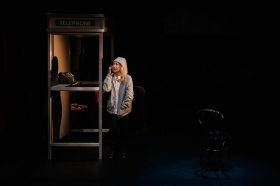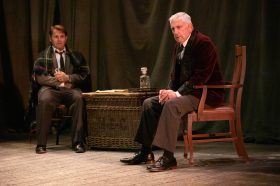Apocalypso is a complicated and multilayered character study that is confronting, uncomfortable and challenging to watch. Arguably one of the roles of fringe theatre is to provoke and question our social norms, and writer/director Tim Wotherspoon is to be commended for crafting a visually dark and dystopian world at Richmond’s The Owl and the Pussycat.
The piece, co-devised and performed by Lily Constantine, Freya Pragt, Nate Charles Troisi and Zak Zavod is highly abstract, abandoning traditional ties to narrative and instead embracing a post-modernist sentiment. The results could be described as a mash up of mythology and Einstein on the Beach which will feel confusing to audiences unfamiliar with the territory. Perseverance is encouraged, for Wotherspoon’s text is as poetic as it is ambitious.
The characters in Apocalypso are stuck in an endless state of limbo and come to explore flashes of memory and reality through playful monologues and brief exchanges. As these characters make sense of their chaos, their frustration spirals and intensifies. Inspired loosely by the myth of the four horsemen of the apocalypse, themes of decay, class systems and power struggles are present within the subtext and energetic performances of the ensemble.
A deliberate focus on linguistics and voice is often hard to follow but nothing different from someone’s first sitting through of a Shakespearean tragedy. By the halfway point of Apocalypso a shift occurs whereby one will come to understand on different levels the relationships between the characters and the manifestation of the underlying subtext. The spoken language essentially appears to falls away, allowing for deeper themes of power, loss and destruction to permeate.
For what’s arguably an exploration of character, at times there’s a lack of satisfying transformations or revelations taking place. While the primal and archetypal representations of the characters are familiar and enjoyable to watch, these characters are tied to the outcomes of their world. In a later scene, two male princes dominate and overpower a female leader in a moment that would have felt more effective if she had instead chosen to rise up against her aggressors. That said, in this instance perhaps Wotherspoon and his ensemble are simply choosing to make a deliberate comment upon masculinity and dominance within society.
The design is brilliant for its simplicity. All dressed in black, the actors each carry a small LED light which conjures images of light, shadow and darkness. The intimacy of the venue place the audience in close proximity, a device that is exploited by the actors in subtle ways to heighten the tension of certain moments.
Apocalypso will divide audiences for all these reasons, but as a memorable and challenging piece of theatre from an emerging Melbourne ensemble, it will certainly spark ongoing conversations.
Rating: 4 stars out of 5
ApocalypsoCo-devised and performed by Lily Constantine, Freya Pragt, Nate Charles Troisi and Zak Zavod
Directed and Written by Tim Wotherspoon
Lighting Consultant: Kris Chainey
Stage Manager/Awesomeness: Jess Keepence
Directed by Tim Wotherspoon
Outside Eye: Aidan Fennessy
The Owl and the Pussycat, Richmond
30 September – 6 October
Melbourne Fringe Festival
www.melbournefringe.com.au
18 September – 6 October





